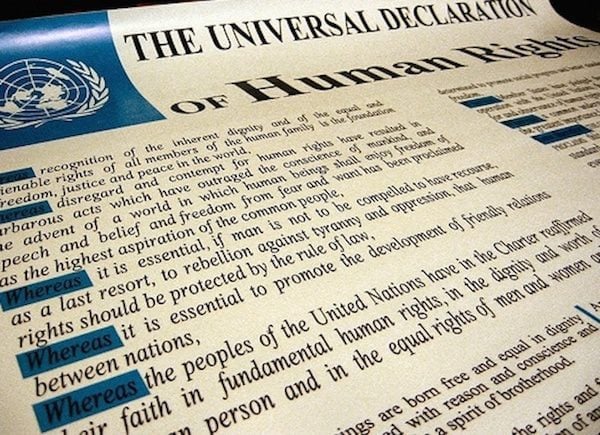
Introduction
The concept of human rights has become a well-known and widely accepted term to use. Varying interpretations are possible, with differences usually being based on cultural background. Nonetheless, most of these understandings consciously or subconsciously include the basic rights outlined in the United Nations’ Universal Declaration of Human Rights.
The United Nations General Assembly (GA) adopted the Universal Declaration of Human Rights on December 10th, 1948. It was written in the aftermath of World War II, “… as a common standard of achievement for all peoples and all nations, to the end that every individual and every organ of society, keeping this Declaration constantly in mind…” Thus it was truly meant to be universal, to protect citizens from any type of violation the world had recently experienced, as outlined in the Preamble and 30 Articles.
As such, it includes articles on the right to life in dignity; liberty and security; freedom of movement; right to nationality and education; just treatment of human beings and respect; as well as freedom of expressions and opinions, from torture or inhumane treatment, as well as economic, social and cultural rights.
International Human Rights Law
The Declaration is not legally binding, but is the basis of international human rights law. Two binding UN covenants were formed as a result of the UDHR; the International Covenant on Civil and Political Rights and the International Covenant on Economic, Social and Cultural Rights. Combined, these three documents are often referred to as the “International Bill of Human Rights”.
Over the years other conventions have been written to expand on and add to this fundament, focusing on a variety of topics such as refugees (1951 and 1967), discrimination of women (‘CEDAW’, 1979) and disabled persons (2008), against torture (1987), protection of migrant workers (1990), and against racial discrimination (1969) to name a few.
Additionally, the International Labour Organization has compiled a large number of conventions specifically related to work force and labour standards, of which 8 are considered ‘fundamental conventions’ and relate to freedom of association (1948, C087), collective bargaining (1949, C098), forced labour (1930, C029 and 1957, C105), minimum age (1973, C138), child labour (1999, C182), equal remuneration (1951, C100), equal opportunity and treatment (C111).
Geneva Conventions
The Geneva Conventions are a revision of previously constructed conventions, adjusted after WWII and specifically focus on treatment of persons in time of war. It consists of four Conventions, and three additional protocols. The International Committee of the Red Cross (ICRC) explains that the Conventions “aims at ensuring that, even in the midst of hostilities, the dignity of the human person, universally acknowledged in principle, shall be respected.”
During a series of expert meetings, congregations by Red Cross agencies, and a confluence of government representatives over time, the articles were revised until a draft was represented at The Diplomatic Conference for the Establishment of International Conventions for the Protection of Victims of War in 1949. The Final Act was signed by fifty-nine nations, some of which no longer exist, and has attained more signatories since.
The Cairo Declaration on Human Rights in Islam (CDHRI) was compiled by the Organisation of Islamic Cooperation (OIC) in 1990, during the 19th Islamic Conference of Foreign Ministers in Cairo, and has 57 signatories. This Declaration holds similar – if not identical – principles as the UDHR, but notably also included articles related to ‘jus in bello’ – acceptable wartime conduct, alike the Geneva Conventions.
The CDHRI also addresses equality between women and men, rights of the child, freedom, right to medical care, right to self-determination, amongst others. Most notably is that this 25 Article document clearly lists the Sharia as reference point including for punishment. The CDHRI has been adopted by 45 countries, out of the total 57 members of the OIC.
Conventions Signed By Palestine
Palestine, represented by the Palestinian Liberation Organization (PLO), requested to be a signatory in 1989, but due to the equivocal status of Palestine as a state this was rejected. It finally was allowed to become signatory on April 2, 2014 when it also signed Additional Protocol I (Protection of Victims of International Armed Conflicts).
On January 4, 2015 Palestine became signed Additional Protocols II and III (Protection of Victims of Non-International Armed Conflicts and Adoption of an Additional Distinctive Emblem respectively). Convention for the Rights of the Child (CRC) as well as the Optional Protocol to the CRC on 2 April 2014. Palestine has been member of the OIC since 1969.
The ILO uses the term “Palestine” exclusively for the Palestinian Liberation Movement, and does not associate it with a geographical region. As such, Palestinian government has not been given the opportunity to ratify any of the fundamental conventions. Despite this, the ILO does carry out extensive work on all the topics of the fundamental conventions in the Occupied Palestinian territories.
Refugees
The Convention relating to the Status of Refugees is based off Article 14 of the UDHR, and recognizes the right of asylum and protection of refugees. It was approved during the General Assembly meeting of December 14, 1950 and came into force on April 22, 1954. However, the original Convention limited its scope to refugees fleeing prior to 1 January 1951. As such, an additional protocol was compiled in 1967, removing these limitations.
Palestine is not party to the Convention, nor its Protocol.
Women
The Convention on the Elimination of All Forms of Discrimination against Women – also called CEDAW, was approved during the General Assembly Session on 18 December, 1979 and entered into force on 3 September 1981. On April 2, 2014, Palestine – listed as State of Palestine in the signatory overview of the Convention – acceded to CEDAW on April 2, 2014 without any reservations.
Through “accession” a state accepts the offer or the opportunity to become a party to a treaty, which has already negotiated and signed by other states. It has the same legal effect as ratification.Countries that have ratified or acceded CEDAW are legally bound to put its provisions into practice, and thereby agree to submit national reports on measures taken to comply with its obligations. Such reports are to be compiled at least every four years.
Persons with Disabilities
The Convention on the Rights of Persons with Disabilities was approved during the General Assembly session on December 13, 2006 and came into force on May 3, 2008. Simultaneously, the Optional Protocol was approved, giving the Committee on the Rights of Persons with Disabilities (CRPD) competence to examine individual complaints with regard to alleged violations by States parties to the Protocol. The CRPD is the body of independent experts that monitors implementation of the Convention. Palestine is not party to the Convention nor the Optional Protocol.
Torture
The Convention against Torture and Other Cruel, Inhuman, or Degrading Treatment or Punishment, also referred to as just the Convention against Torture, was adopted during the General Assembly session on December 10, 1984. On June 26, 1987 it was registered and thereby came into force.
Its implementation is monitored by the Committee Against Torture (CAT), composed of ten individuals of various nationalities. All signatory states are obliged to send regular reports to the CAT, based on which recommendations are made. Palestine is not party to the Convention against Torture.
Migrant Workers
The International Convention on the Protection of the Rights of All Migrant Workers and Members of their Families was approved by the General Assembly on December 18, 1990 and entered into force on July 1, 2003. Palestine is not party to the Convention.
Racial Discrimination
The Convention on the Elimination of All Forms of Racial Discrimination was approved by the General Assembly and accordingly opened for signature on March 7, 1966. It entered into force on January 4, 1969. Despite the obvious as stated in the Convention title, it aims to obliterate hate speech and promote understanding.
Implementation of the articles is monitored by the Committee on the Elimination of Racial Discrimination, to which bi-annual reports are submitted by each signatory. It also is responsible for handling inter-state and individual complaints related to non-conformity to the provisions of the Convention, as prescribed in Article 14.
Palestine, referred to as the “State of Palestine”, acceded to the Convention on April 2, 2014 with no reservations.
Latest Articles
Below are the latest articles by acclaimed journalists and academics concerning the topic ‘Human Rights’ and ‘Palestine’. These articles are posted in this country file or elsewhere on our website:





















